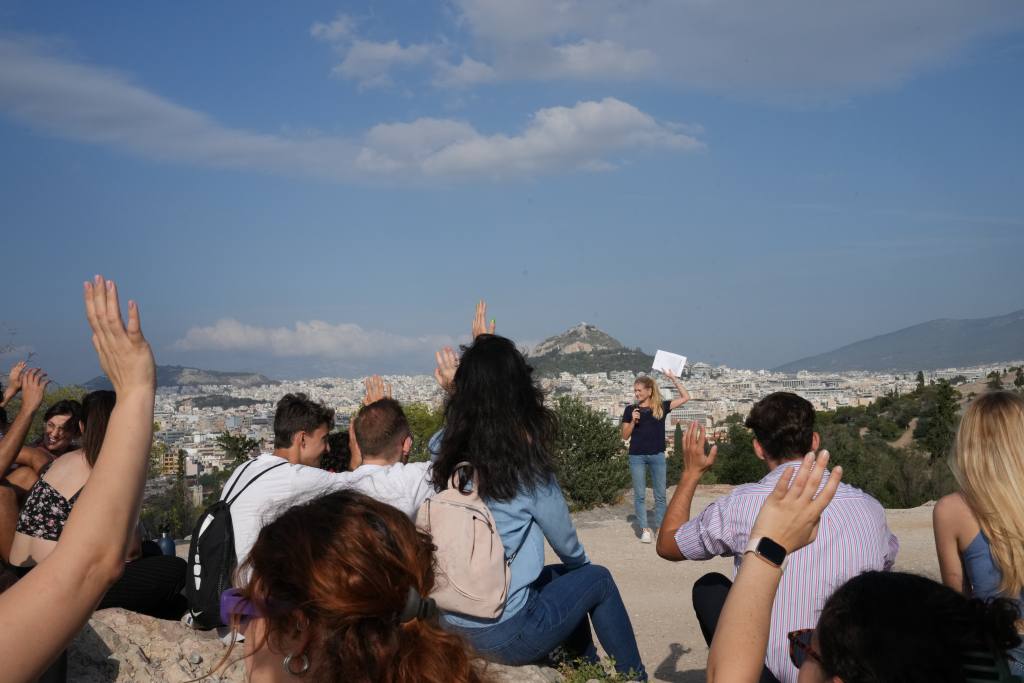
Democracy is more central to the future of Europe than ever before. It is only through widespread and empowering civic deliberation, participation, and citizen involvement in decision-making that the polarised conflicts in Europe – e.g. regarding the environment, migration, agriculture, security – can be resolved. It is by allowing for more civic voice and transparency that social, intergenerational, and climate justice can be restored or even strengthened, and lasting peace can be secured. Citizens and civil society are essential in their role as watchdogs of proper political dialogue and policy-making, as well as to deter corrupt practices. As various authoritarian challenges to democracy show us in a dramatic way, it is only by extensive and meaningful citizen involvement in politics that much needed democratic resilience can be enhanced in practice. Citizens Take Over Europe therefore calls for a leap forward in the democratisation of the European Union.
CTOE calls on the political parties and independent candidates for the 2024 European Parliament elections to remedy the democratic deficits in the EU. This means that the EU institutions need to follow up in a clear, transparent and effective manner to the democratic reform proposals formulated by the Conference on the Future of Europe. The EP should take the lead in institutionalising the demands both in its own procedures and within its powers and calling on the other European institutions to do so. So far, the political proposals have not been taken up by the institutions, as CTOE has noted again and again.
We request more specifically from our political representatives:
- The creation of permanent citizens/people’s assembly for Europe; including a mechanism of mandatory, transparent, and detailed follow-up to such an assembly’s recommendations by the institutions of the European Union;
- The insertion of a meaningful citizen component into the Convention procedure for EU Treaty change. The European Parliament has already adopted a fair number of proposals for Treaty amendment and has called for a Convention. Core demands relating to EU democratisation should be made central to the process of Treaty reform. This means that the ordinary Treaty revision procedure should include robust formats for citizen and civil society participation and deliberation. The inclusion of citizens from accession states should be guaranteed in this process to ensure the EU is preparing in a democratic way for its future.
- Making the European Citizens’ initiative (ECI) a real democratic instrument. The ECI instrument is to be transformed into a direct right of initiative in which citizens’ proposals are to be submitted directly to the legislator (European Parliament and Council of the EU) for consideration. Moreover ECIs should be given the right to initiate a European Citizens’ Assembly. ECIs should also have the right to put forward proposals that may involve Treaty change, thereby giving citizens the possibility to exercise constituent power;
- A pan-European referendum should be established that can be initiated by citizens and prepared by a European Citizens’ Assembly. The purpose of the Assembly is to discuss and recommend a referendum text that will be put to voters. Its design will aim at triggering public interest and trigger an informed public debate before an actual referendum is held.
- An empowering European digital platform for participation, accessible through a European Digital Citizenship. It should allow citizens to sign petitions, ECIs, interact with each other, and should include civic artificial intelligence giving information on the access to European public services and participatory venues for citizens and civil society organisations;
- Electoral reforms and Europeanising EP elections, establishing: a) for all European citizens and long term residents an equal right to vote that is based on pan-european electoral standards; b) transnational lists that offer citizens the choice among candidates selected by national political parties and running only in one member state as well as European candidates selected by European party alliances and running in multiple member states; c) the right to vote for people with longer residence in the EU; d) the creation of new parties and the collection of signatures for the presentation of new electoral lists should be simplified and made accessible.
- Radical transparency as a right ensured to the European public with regard to lobbying practices by corporate entities and private stakeholders vis-à-vis European leaders, MEPs and public servants. This includes accountability and transparency of conflict of interests, financial receipts and so on, from the part of EU political decision-makers;
- The consolidation of a democratic ecosystem throughout Europe where decisions should systematically and meaningfully involve those that are most affected by them, particularly through their local authorities and communities, and where relevant local citizens’ assemblies and other forms of participation;
- Protecting European civil society organisations by developing instruments for safeguarding and enhancing civic spaces in domestic contexts as well as at the transnational level, provide robust funding schemes for civil society organisations, and develop a permanent instrument for monitoring and checking EU legislation on whether it promotes or harms the functioning of civil society.
- An EU Enlargement that reinforces democracy and a strong civil society as prerequisites for membership in the EU, involving citizens both in the accession countries and in the EU in the accession process through citizens assemblies and other forms of participation and deliberation.
SIGN THE PLEDGE!


